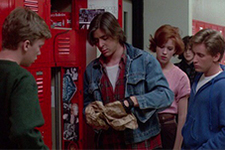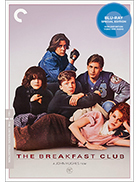The Breakfast Club
|  There were so-called “teen movies” before John Hughes’s The Breakfast Club—hundreds of them, in fact, particularly in the Boomer drive-in heyday of the 1950s and ’60s—but they would never be quite the same after. Hughes’s poignant, sometimes funny, and always thoughtful drama about five suburban teens stuck in an all-day Saturday detention didn’t so much revolutionize the teen movie as it mined the genre for long-ignored potential by taking its adolescent characters and their social problems seriously as a meaningful facet of shared human experience. Teenage viewers (many of whom, ironically, weren’t allowed to watch the film due to its R-rating) understood its prescient drama and its knowing comedy, and they identified with not just the character most like them, but with all of them—the spoiled “princess,” the awkward “brain,” the determined “athlete,” the antisocial “basket case,” and the provocative “criminal.” There had certainly been sensitive and knowing Hollywood films about adolescent characters in the years prior to The Breakfast Club, but many of them used a self-consciously nostalgic past tense to frame their stories and characters—Peter Bogdanovich’s The Last Picture Show (1971), Robert Mulligan’s Summer of ’42 (1971), George Lucas’s American Graffiti (1973), Daniel Petrie’s Buster and Billie (1974), and Francis Ford Coppola’s The Outsiders (1982) and Rumble Fish (1983), to name a few. Previous decades had also had their share of films that dealt explicitly and seriously with adolescent angst, including Nicholas Ray’s iconic Rebel Without a Cause (1954) and Elia Kazan’s Splendor in the Grass (1961), although they were often framed primarily as tragic romances. Hughes dispensed with both nostalgia by setting the film in the present tense and discarded conventional romance in favor of fly-on-the-wall sociological observation. The film’s set-up is pure contrivance, but it works because Hughes uses the contrived scenario to dig at and reveal genuine truths about the characters that speak to the wider adolescent experience, which is why the film has maintained its appeal to young viewers decades after its release. The story opens with each of the students arriving at the fictional Shermer High School—a large, blocky, imposing concrete edifice—for an all-day Saturday detention. We learn a little bit about each character by the way he or she arrives: the rich and popular Claire (Molly Ringwald) bemoaning to her Burberry-scarfed father that he couldn’t “get her out” of the punishment; the jock Andrew (Emilio Estevez) being chastised by his alpha-male, Bronco-driving father not to risk losing “his ride”; math nerd Brian (Anthony Michael Hall) being berated by his mother to find a way to make use of his time in detention by studying; basket case Allison being dropped off with such brusque rapidity that she can’t even tell her unseen parent “good-bye”; and delinquent John Bender arriving alone and angry and self-absorbed. Hughes, who both wrote and directed, allows the early portions of the film to play out slowly and with minimal dialogue, as the detained teens at first adhere to the rigid policies of the humorless principal Richard Verner (Paul Gleason) and stay in their seats. Hughes finds bits of knowing humor in the way they try to pass the time—Brian chewing on his pen, Andrew pulling on the strings of his sweatshirt hood, Allison raining dandruff on her highly detailed pen drawing of a picturesque bridge. Bender is the provocateur (his name evokes bending the rules, although he more often just breaks them), and he is the first to shatter the imposed silence and encourage disobedience, which at first brings down Verner’s coiled wrath, but later allows the kids the space they need to interact and get to know each other, a process that involves conversations both casual and serious, chummy and antagonistic, gracious and insulting. Because each character hails from a distinctly different social group, the interactions are initially hostile, especially as initiated by and often filtered through Bender’s angry worldview. He is particularly aggressive toward Claire and Andrew, the former of whom he taunts mercilessly and the latter of whom he feels the need to challenge. Bender’s provocations are expressions of his own insecurity, a trait that all of the characters eventually discover they share even as they deal with it in wildly different ways. As Andrew puts it in one of the film’s most on-the-nose lines, “We’re all pretty bizarre. Some of us are just better at hiding it, that’s all.” The discovery of sameness is the film’s unifying theme, as the five teens slowly learn that they are more alike than they are different. The differences that have divided them and that will, as Claire bravely notes, again separate them come Monday morning, are all surface—in clothes and friends and socioeconomic status—whereas the similarities are deep-seated and fundamentally defining of who they are beyond cliques and social norms. Much of their identity is rooted in their shared animosity toward their parents and the repression they represent: Andrew and Brian being pressured to perform athletically and academically, Claire’s being caught in the middle of her parents’ constant feuding, Allison’s being ignored, and Bender’s being physically and verbally abused. In realizing this shared heritage, they are forced to recognize that those who are seemingly most different are actually the most similar. The jock and the brain both have to deal with parents who won’t accept failure; the princess and the criminal are both used as punching bags to relieve their parents’ anger, the former figuratively and the latter literally. Hughes, who began as a writer for the satire magazine National Lampoon before becoming a successful screenwriter in the early 1980s with a string of commercial hits including National Lampoon’s Vacation (1983) and Mr. Mom (1983), had a knack for understanding and conveying the unique pressures, anxieties, joys, and frivolities of American suburban teenagerdom. In the three years between 1984 and 1987, he wrote and directed four teen-centered films (1984’s Sixteen Candles, The Breakfast Club, 1985’s Weird Science, and 1986’s Ferris Bueller’s Day Off) and supplied the scripts for two others (1986’s Pretty in Pink and 1987’s Some Kind of Wonderful, both of which were directed by Howard Deutch). Although these films are quite varied, they all display a sensitivity toward their teen characters, even when working in an expressly comic vein (the absurdist Weird Science is the raunchiest of the bunch, but even it leaves plenty of room for empathy for its attention-starved nerd protagonists). They all display Hughes’s ear for dialogue and understanding of the way teens communicate—sometimes directly, but often awkwardly, partially, or in overly earnest attempts to convey their deeply felt understanding of the world. All of these films also embody the eternal conflict between kids and adults, the latter of whom tend to represent all that is repressive and hurtful, an arguably simplistic viewpoint that Hughes uses extensively in The Breakfast Club. All of the kids’ parents are failures of one sort or another, and Verner is just a few shades shy of Ferris Bueller’s Ed Rooney in the fascist authority figure department. Yet, it’s hard to begrudge Hughes this narrative conceit, since it gives his teen characters something over which they can bond and with which the film’s teen viewers can immediately identify. It’s a means of seeing the word through the characters’ eyes, when everything seems monumental and adults seem like aliens hell-bent on ruining their world, without condescending to them. If The Breakfast Club has a real flaw, it is the final 10 minutes, which find Hughes falling into some kind of bizarre narrative trap that insists on romantic pairing of four of the five characters. Not only does this development feel largely forced and unbelievable, but it fundamentally cuts against the film’s underlying idea that these characters’ connections have been forged within the unique confines of their detention and that the everyday world into which they must emerge will necessarily separate them again. It feels too much like a forced feel-good coda that suddenly and awkwardly tries to adhere to expected Hollywood norms when so much of the film had been so good precisely because Hughes had refused to play by the rules.
Copyright © 2018 James Kendrick Thoughts? E-mail James Kendrick All images copyright © The Criterion Collection | |||||||||||||||||||||||||||||||
Overall Rating: 


 (3.5)
(3.5)


